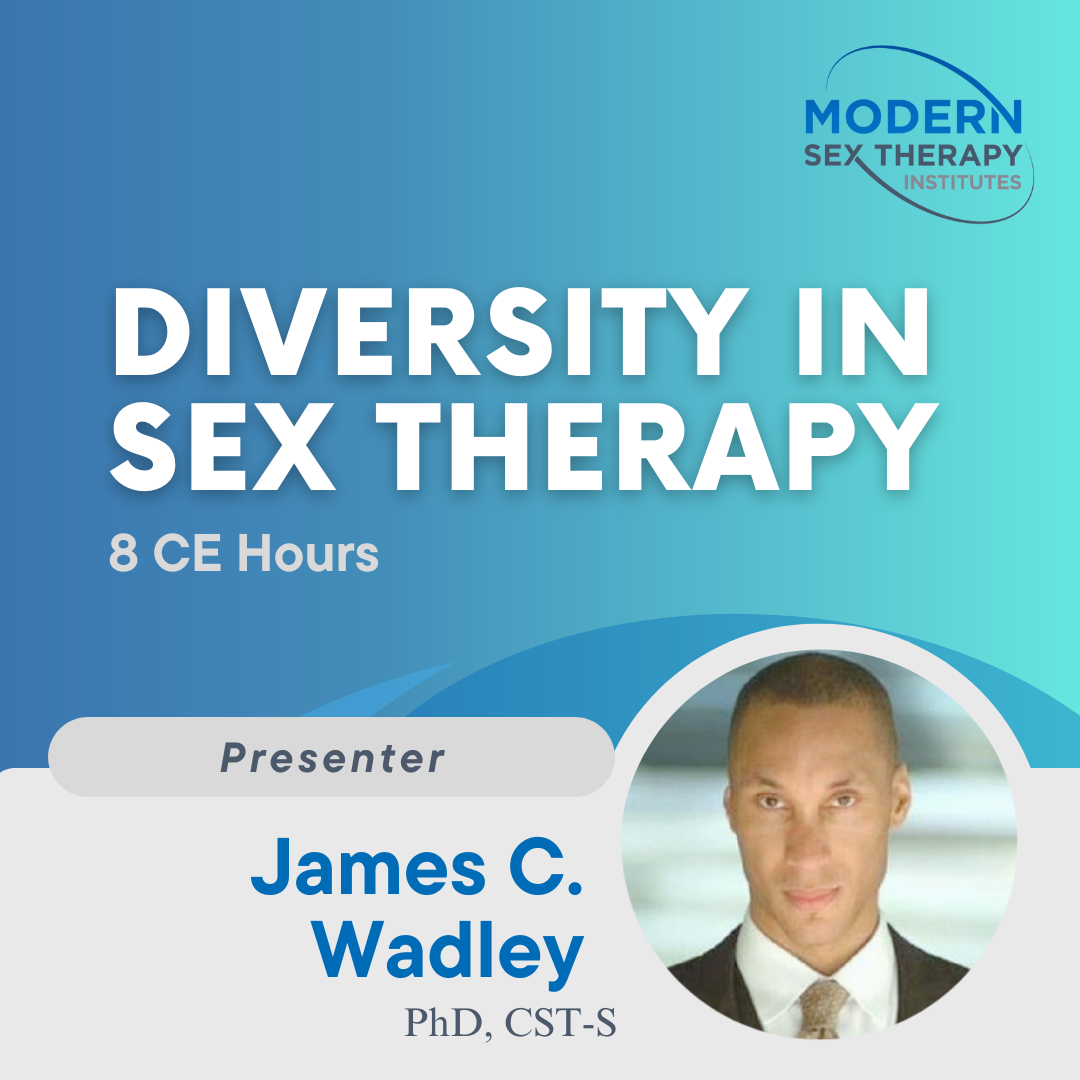Diversity in Sex Therapy (8 CE Hours)
$320.00
8 CE Hours
Presented by: James Wadley, PhD
Recorded workshop available via video on demand
AASECT Category:
Human Sexuality Education
Section C
AND
Section F
AND
Sex Therapy Education
Section A
Sexual diversity should be viewed as a continuum and interplay of identities, roles, values, and history and those cultural factors that may influence relational decision making. The challenge that some sexuality therapists have is the recognition of these complex interpersonal and intrapersonal factors as well as an exhibition of an affective and behavioral skill set that allows clients and constituents to feel as if counselors “get it.” Our understanding and ability to demonstrate acknowledgement, compassion, and direction is needed within our field as well as with the clients with whom we work with. Using social construction as a lens, the training is an invitation to critically assess systemic factors that may enable or impede effective sex therapy as well as how we as therapists govern ourselves within and outside of a therapeutic environment. The goal of the training is for participants to be more attuned with sexual diversity and have an understanding of the necessary traits needed by sex therapists.
By the end of the training participants will be able to
Explain what sexual diversity is and why it might be important to address it.
List 2 traits of being an effective sex therapist.
Describe two current trends of sexual diversity and how it is a part of our personal and professional lives
Explain the role of multiculturalism, race, and becoming culture centered.
Explain the influence of power, privilege, and systemic oppression in providing sex therapy with diverse communities.
Discuss the challenges of addressing heterosexual and cisgender privilege in therapy.
Describe the role of countertransference, empathy, and compassion.
Describe three strategies for celebrating sexual diversity within their personal/profession experiences.
Activity schedule
1 hour
Objective #1
Participants will be able to identity what sexual diversity is and why it might be important to address
- Introduction, scope of workshop, and topics covered
- What is sexual diversity and why it might be important to address
1 hour
Objective #2
Participants will be able to identify at least 2 traits of being an effective sex therapist
- Overview of effective sex therapy
1 hour
Objective #3
Participants will be able to identity at least two current trends of sexual diversity and how it is a part of our personal and professional lives
- Current trends in sexual diversity is a part of our personal and professional lives
- What our role might be as sexuality therapists
1 hour
Objective #4
Participants will be able to identify the role of multiculturalism, race, and becoming culture centered.
- The role of multiculturalism and becoming culture centered
- The impact of considering race in sexual diversity
1 hour
Objective #5
Participants will be able to identify the influence of power, privilege, and systemic oppression in providing sex therapy with diverse communities.
- Our use of power and privilege in providing sex therapy
1 hour
Objective #6
Participants will be able to identify the challenges of addressing heterosexual and cisgender privilege in therapy
- Discussion about the efficacy of addressing heterosexual and cisgender privilege in therapy.
1 hour
Objective #7
Participants will be able to identify the role of countertransference, empathy, and compassion.
- Explore the role of countertransference, empathy, and compassion
1 hour
Objective #8
Participants will be able to identify at least three strategies for celebrating sexual diversity within their personal/profession experiences.
- Celebrating sexual diversity and how its intricately woven with culture
- Questions, reactions, and evaluation
Speaker Bio:
Dr. James Wadley is Associate Professor and Director of the Master of Human Services Program at The Lincoln University. As a scholar-practitioner, he is a licensed professional counselor and maintains a private practice in the states of Pennsylvania and New Jersey. He is the founding editor of the scholarly, interdisciplinary journal, the Journal of Black Sexuality and Relationships (University of Nebraska Press). He is also the founder and Principal of the Association of Black Sexologists and Clinicians and his professional background in human sexuality education and educational leadership has enabled him to galvanize scholars and practitioners in the field of sexology across the world.
Dr. Wadley received his Doctorate of Philosophy in Education from the University of Pennsylvania with a concentration in Educational Leadership and Human Sexuality Education. He earned a Master of Science in Education in School Psychology from the University of Kentucky after completing his BA in Psychology from Hampton University. Finally, he holds a clinical postgraduate certificate from Thomas Jefferson University/Council for Relationships in Philadelphia and several other state certifications that enable him to be one of the nation’s best marriage, family, and sexuality clinicians.
Class originally recorded: 2/19/2021.
Social workers completing this course receive 8 cultural competence continuing education credits.

